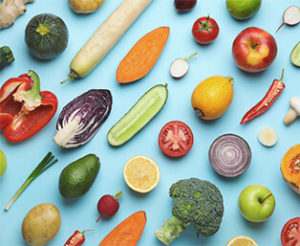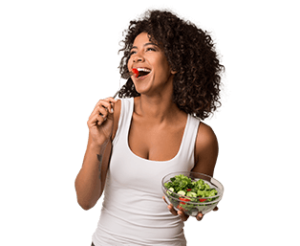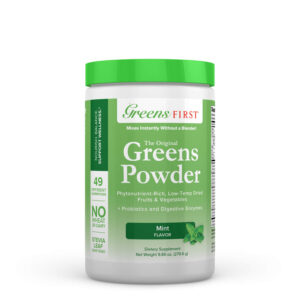With today’s busy lifestyle, it can be difficult to balance your health and nutrition with the rest of your day. Whether you're commuting, working, or taking care of the family, it can be tough to always eat nutritious foods. In addition, cooking takes up valuable time and energy, and the cheapest prepared foods tend to be high in calories but low in nutrients.
Thankfully, we've compiled 8 tips you can start implementing today to get your body the nutrients it needs without having to compromise your productivity or sleep.
Eat A Healthy Breakfast

Find a few nutritious meals that are easy to make for breakfast, and have them often. Keeping easy, go-to recipes will help you start your day with the nutrients your body needs to thrive.
A good breakfast can be anything nutritious and filling, and should be something that you enjoy eating and feel comfortable making in the limited time you have in the morning. Some options include a fruit smoothie with protein and greens, an omelet with vegetables, or oatmeal with berries. It can be beneficial to start your day by incorporating some plant foods that provide important nutrients, like green leafy veggies or antioxidant-rich fruits. You could also simply add a scoop of Greens First Phytonutrient Powder to your meal for similar benefits, whether it is mixed into a smoothie or yogurt, or simply stirred into a glass of cold water.
When figuring out what to eat, first decide whether you plan to eat before you leave to start your day or if you're taking it on the go. If you feel you don't have enough time to add breakfast to your morning routine, some solutions could include shifting your sleep schedule 15 minutes earlier or making a breakfast the night before that's easy to quickly grab and bring with you in the morning, like overnight oats or a protein shake.
One of our favorite fast, on-the-go recipes is to pour some water into a shaker cup with berry flavored Greens First and a scoop of vanilla Dream Protein for a quick and easy Berries & Cream shake (bonus points for adding a little vanilla extract). To make it a more filling and complete meal, you can add another scoop of protein powder, some chia seeds, and a tablespoon of acacia fiber, or dream up your own unique flavors and recipes!
Plan Ahead
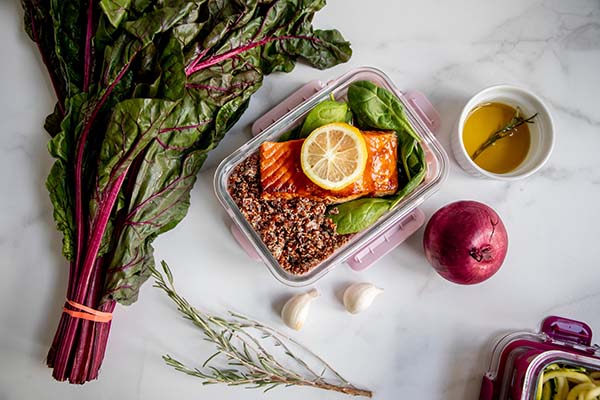
If you can make time for it, prepping meals ahead of time is often beneficial. Planning quick & healthy meals that the whole family enjoys and prepping them ahead of time can help you spend less time in the kitchen and reach your health goals faster. Plus, cooking for yourself saves money and allows you to choose healthier, more nutrient-dense foods. It's a good way to avoid the unhealthy ingredients found in many hyper-palatable processed foods.
This can include cooking in bulk and freezing food to last a while. Meal prep doesn't have to be a daily practice, it can be weekly or even less frequent. It's also not all-or-nothing. You can meal prep one meal for each day instead of making your entire day's food ahead of time. When cooking in advance, it's helpful to mark the date you cooked it on a piece of tape stuck to the outside for later reference. Many foods can stay good in the freezer for weeks or even months.
It's also a good idea to think about your whole day of eating and plan out what you think you might eat later to help you figure out how much to eat now. For example, if you know you're not going to be able to make time to eat in the middle of the day, a larger and more nutrient-rich breakfast can ensure that you have enough energy to carry you through to your next meal.
Drink Lots of Water

Water is nourishing and important to almost every process in the body, but it also does more than that. Water can help keep you feeling full between meals, reducing hunger pangs and helping you make nutritious choices.
The hungrier we are, the lower our standards and inhibitions are when it comes to food choice. “Willpower” usually helps us choose protein and vegetables over salty or sweet processed foods that are high in calories and low in nutrients. Excessive hunger reduces our willpower's defenses and can lead us to choose foods we wouldn't usually eat.
Staying hydrated can help us keep our resolve strong when making food choices. The “right” amount of water varies from person to person, but a safe goal to aim for is at least 8 glasses of water (64oz) per day.
Travel With Snacks
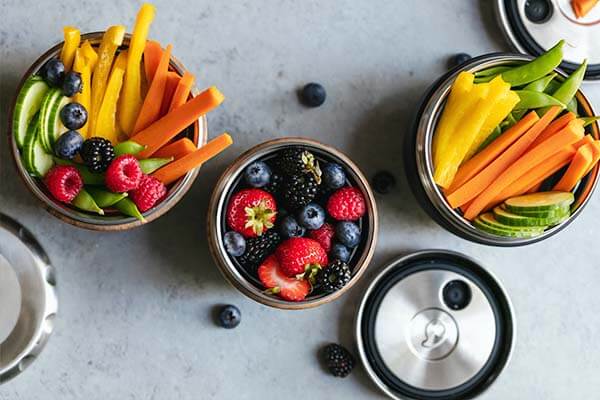
Bring some nutrient-rich snacks to keep you satiated even when you're on-the-go. It's usually easy to find room in your bag for a protein shake, some fruit, or a healthy snack like baby carrots and almond butter.
By packing your snacks ahead of time, you can choose what you'll eat at a time when you're not feeling hungry. Decide what snack works best for your body when hunger doesn't have an influence, it often leads to more nutritious food choices, less overeating, and smaller portion sizes. When we choose our food while hungry, we tend to overestimate how much we need to eat as well as have lowered inhibitions to resist less nutritious options.
You'll want to find something to keep you nourished and energized throughout the day without pushing you over your daily calorie goal. We recommend using a calorie tracking app on your phone when starting out, it can help you figure out how much food to portion out for a reasonable snack – you might be surprised by what a tablespoon of peanut butter (or your favorite nut butter) actually looks like!
Eat The Rainbow
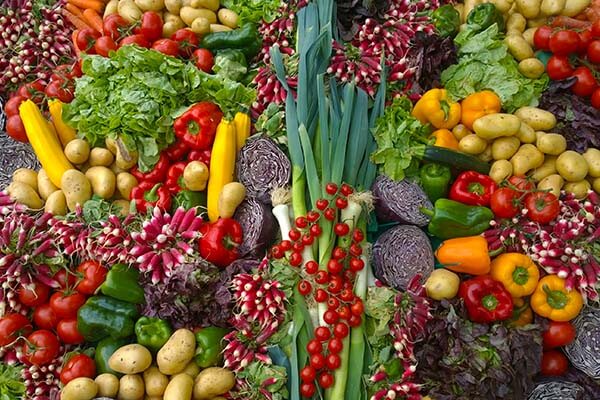
There's a reason why almost every diet prioritizes vegetables: they're the most nutrient dense foods around. They're also incredibly filling for how low they are in calories and provide plenty of fiber to improve digestion and gut health. Vegetables provide our bodies with antioxidants, vitamins, minerals, and phytonutrients. These are all vital to helping our bodies stay healthy.
Leafy greens are also especially beneficial, but it's important to eat a rainbow of different vegetables. Different colored plant pigments indicate an array of essential vitamins and phytonutrients found in each plant, for example:
- Dark Purple or Blue produce like Eggplant and Red Cabbage have pigments called “Anthocyanins” which act as powerful antioxidants and may support heart health as well as defend against cancer development.
- The Red pigment that gives Strawberries, Cranberries and Tomatoes their color is a carotenoid called “Lycopene”, which acts as an antioxidant to help prevent various illnesses like heart or lung disease.
- Yellow and orange vegetables like carrots and sweet potatoes contain “Beta Carotene,” a pigment that our body converts into Vitamin A, which is vital for vision health, immune function, and more.
- Green Vegetables contain many of the other pigments and antioxidants mentioned above, as well as an assortment of cancer-blocking compounds that protect against carcinogens. Veggies like Kale, Spinach, and Avocado have nearly boundless nutrition beyond the calories, carbs, and fat you'd see on a nutrition facts label.
These same compounds exist in fruits as well. Berries (blue-, straw-, rasp-) and dark cherries in particular are very high in antioxidants like Anthocyanins & Lycopene. They are also relatively low on the Glycemic Index compared to other fruits. That means they cause less of a spike in blood sugar while providing longer-term energy.
Increase Your Protein Intake & Quality
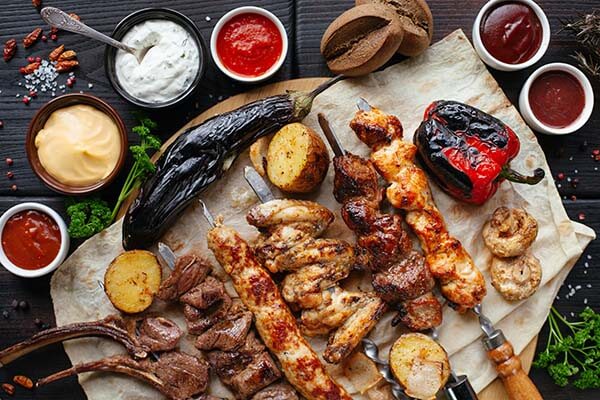
A higher protein diet is associated with a number of benefits, including decreased appetite, less body fat, and more muscle mass. Protein can also support bone health, lower blood pressure, and bodily repair.
One major perk of protein is that it is the most satiating macronutrient, meaning you'll feel full from fewer calories of protein compared to fat or carbs, and stay feeling full throughout your busy day. Additionally, while each gram of protein is 4 calories, our bodies use up 1 calorie of energy to digest each gram of protein, so the caloric impact of protein is actually only 3 net calories after digestion.
It's recommended that we eat between .5g and 1.5g of protein per pound of lean body weight, so for someone who weighs 180 lbs with 20 lbs of fat, their daily protein should range between 80g and 200g depending on their health goals, activity levels, and muscle mass.
It's important for people to increase their protein intake as they age, especially for women. Our bodies become less efficient at utilizing protein, so we need more protein for the same benefits. Studies have shown that a higher protein diet in women over 60 is correlated with more muscle mass, improved bone density, lower body fat, and improved health biomarkers.
For people on a plant-based diet, increasing their protein intake could mean more beans and lentils, mushrooms, peas, and other higher-protein vegetables. There are also a number of good vegan protein powder blends out there, like Greens First's Dream Protein Plant-Based, a blend of organic pumpkin, pea, and hemp proteins that provide a complete amino acid profile and delicious, creamy texture in delicious chocolate or vanilla flavors.
For those without dietary restrictions, meat continues to be one of the most efficient and complete sources of lean protein. However, when eating meat, don't shy away from the most nutrient-rich parts. It has become standard to eat skinless white meat chicken breast, yet the skin is full of collagen. Collagen is a vital protein that our body utilizes to keep our joints, skin, and hair healthy.
Not only that, we can use the bones to create bone broth, a delicious starting point for many different soups. Bone broth is also rich in collagen as well as various other nutrients. Soups made with bone broth are easy to prepare ahead of time and then reheat and bring with you in a thermos.
Avoid Processed Foods & Fried Foods

Not only do they contain few micronutrients, but processed and fried foods can also be damaging to a healthy gut microbiome. That means they can impair your absorption of nutrients at other meals and cause physical symptoms like brain fog, anxiety, or digestive distress.
These foods, like potato chips or cookies, are also very calorie dense, so they tend to be less filling. Plus they are hyper-palatable, meaning incredibly delicious as well as crunchy. That combination can very easily lead to overeating, and that's how we end up eating a whole family-size bag of chips or entire box of cookies before we realize what we've done.
Eat More Fruits and Vegetables

It's recommended that we all get 2-3 servings of fruit and 5-7 serving of vegetables each day. As we mentioned earlier, the more colorful and diverse, the better. We don't always have time to cook, and meal prepping can be difficult when you're exhausted from a tough day and want to pick up food and unwind. At any restaurant you go to, there will always be options that include vegetables. Seek these out to ensure that even the meals you don't cook for yourself have some nutrient-dense foods included.
By far the quickest, easiest, and cheapest way to ensure that your body gets an adequate amount of plant nutrients each day is with a greens powder. Add a scoop of Greens First Phytonutrient Powder to your daily routine. With 49 superfoods plus probiotics and digestive enzymes, it'll supercharge your diet with a wide variety of antioxidants and other plant-based nutrients
The variation and diversity of plants in the diet matters as much as the amount of veggies consumed. Studies have shown that the healthiest gut microbiomes tend to exist among individuals who consume at least 30 different types of fruits and vegetables each week. Greens First can help you surpass that feat each day with just one serving. Add a scoop to 8oz of cold water, or throw a scoop into your usual protein shake for a delicious boost of plant nutrients.
Each scoop of Greens First provides over 15 servings of 49 different fruits and veggies, as much as double the daily recommendation for each. The produce is naturally juiced and dried at low temperatures to ensure the nutrients remain intact. Every serving provides an assortment of different plant nutrients and vitamins. Achieving this kind of dietary diversity would be difficult through diet alone. Greens First is a nutrient-dense solution to get more veggies in your diet.
Greens First also contains a probiotic blend, prebiotic fiber, and digestive enzymes, with no wheat or dairy. That means it is very gentle on the stomach and can improve gut health in addition to supporting pH balance and overall health.
Get Enough Sleep

Consistent, high-quality sleep is vital for our health in many ways. It helps us stay alert, focused, energetic, and clear-headed throughout the day. It also promotes healing and repair in our bodies. But one of its less talked about functions relates to appetite.
When we don't get enough sleep, it messes with our hunger hormones and causes them to be overactive. That's why after a night of poor sleep we are often hungrier and more likely to choose less nutritious, higher calorie options when it's time to eat.
Ghrelin is a hormone that causes the sensation of hunger, while Leptin is a hormone that helps us feel full. When we sleep, Leptin levels typically increase, subduing the urge to eat. It makes sense, then, that sleep deprivation lowers Leptin levels, while at the same time increasing ghrelin levels, making us feel ravenously hungry when we don't get enough rest.
A lack of sleep can also influence our food choice. It's similar to the way that increased hunger can often lead to less nutritious, more calorie-dense food choices (like going food shopping on an empty stomach). The aforementioned spike in hunger from not sleeping causes us to crave sugary, fatty, and salty foods while lowering our inhibitions to resist those cravings.
To ensure you're getting optimal sleep, a consistent circadian rhythm is key. Try to maintain similar sleep/wake times (within an hour window), even on weekends. Exposing your eyes to sunlight or bright light soon after waking also helps regulate your circadian rhythm and improves sleep quality, as does red light therapy in the evening. Maintaining a cool, quiet, and comfortable sleep environment can also help improve the restfulness and healing benefits of your sleep. When you're someone who doesn't necessarily have more time to devote to sleep, improving sleep efficiency can be a way to wake up more rested from the same number of hours in bed.
Busy Doesn't Have To Mean Unhealthy

Try integrating the information above into your eating plan to create a nutrient rich diet that supports your busy lifestyle.
To summarize:
- Prioritze eating vegetables and quality sources of protein
- Avoid fried or processed foods
- Drink more water
- Plan out what you intend to eat
- Supplement with a nutrient-rich greens powder
- Get plenty of restful sleep


